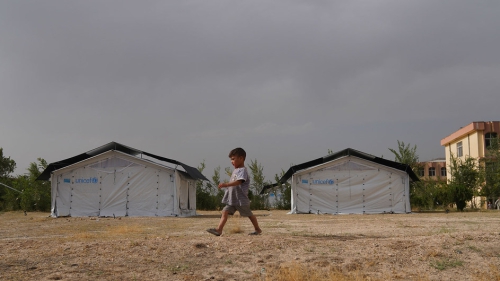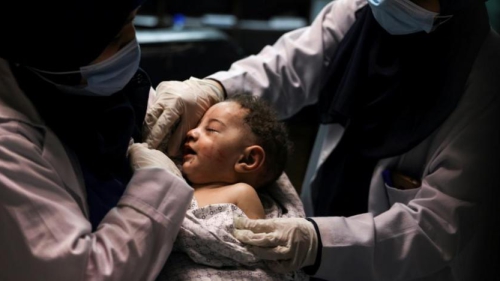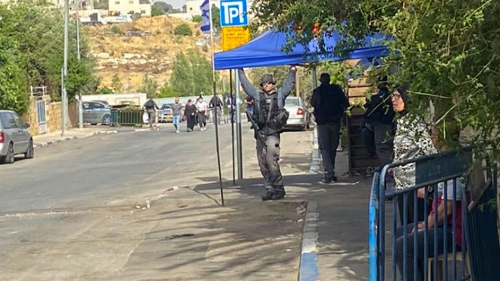From Humanitarian to a Nation
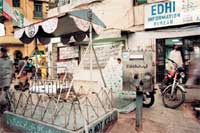 |
| Edhi information Bureaus in Karachi, one of about 300 throughout Pakistan. From here several services are provided which include ambulance, a free kitchen, missing person information, etc. Like all Edhi centers, it has a shaded cradle outside its door, with a sign that reads "Do not kill". Children left in the cradle are housed in one of its 13 centers. |
In the cool interior of a mental ward in Karachi, a short, powerfully built man with a flowing snow-white beard and penetrating dark-brown eyes is standing at the bedside of a distraught young woman. She has covered her head with a sheet and is pleading for news of the two children her husband took from her.
"I know you are suffering terribly, but this is no way to bring back your children," says the man with stern compassion. "You have a college degree. You can do many things to help the other patients."
Outside the room's windows of latticed stone, several hundred other women stroll and lounge under pipal trees scattered around a courtyard as big as several football fields. All are here because their families cannot-or will not-cope with their mental illnesses.
"Self-help," says the man as he walks away from the young mother's bedside. "That's the best way to get back on your feet."
For more than half a century, Abdul Sattar Edhi, now 76 years old, has been living proof that a determined individual can mobilize others to alleviate misery and, in so doing, knit together the social fabric of a nation. Firmly refusing financial support from both government and formal religious organizations, this self-effacing man with a primary-school education has almost single-handedly created one of the largest and most successful health and welfare networks in Asia. Whether he is counseling a battered wife, rescuing an accident victim, feeding a poor child, sheltering a homeless family or washing an unidentified and unclaimed corpse before burial, Edhi and Bilquis, his wife of 38 years, help thousands of Pakistanis each day.
Starting in 1951 with a tiny dispensary in Karachi's poor Mithadar neighborhood, Edhi has steadily built up a nationwide organization of ambulances, clinics, maternity homes, mental asylums, homes for the physically handicapped, blood banks, orphanages, adoption centers, mortuaries, shelters for runaway children and battered women, schools, nursing courses, soup kitchens and a 25-bed cancer hospital. All are run by some 7000 volunteers and a small paid staff of teachers, doctors and nurses. Edhi has also personally delivered medicines, food and clothing to refugees in Bosnia, Ethiopia and Afghanistan. He and the drivers of his ambulances have saved lives in floods, train wrecks, civil conflicts and traffic accidents. After the September 11 attacks on the World Trade Center, he donated $100,000 to Pakistanis in New York who lost their jobs in the subsequent economic crisis.
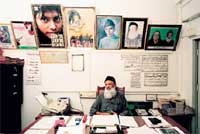 |
| Abdul Sattar Edhi in his Karachi office |
Remarkably, the lion's share of the Edhi Foundation's $10-million budget comes from private donations from individual Pakistanis inside and outside the country. In the 1980's, when Pakistan's then-President Zia ul-Haq sent him a check for 500,000 rupees (then more than $30,000), Edhi sent it back. Last year, the Italian government offered him a million-dollar donation. He refused. "Governments set conditions that I cannot accept," he says, declining to give any details.
Usually dressed in a simple tunic over gray pajamas, scuffed sandals on his feet and his trademark astrakhan hat on his head, Edhi outlines his philosophy in the Mithadar dispensary where he launched his charity more than five decades ago. "I tell people that, because I am working for you, the money must come from you," he says. For years, this meant that Edhi would take to the streets to beg on behalf of his growing social programs. Even in his 70's, he still occasionally begs on the streets, generally for the sake of severely ill individuals in urgent need of expensive medical care that his clinics cannot provide.
Generally, however, donors come in person to one of the 300 centers and clinics across Pakistan. One, who declined to give his name, explained that he gives money regularly to the Edhi Foundation because an Edhi ambulance once rescued his sister from an automobile accident. (The cost of an ambulance call-one of the few services for which the foundation charges-is less than 50 rupees, or around 85 us cents.) "When I give this 1400 rupees to Edhi, I know it goes to people who need it," says the donor.
Some donors have been very generous. One family donated two villas in the wealthy Karachi suburb of Clifton for use as a residence and school for around 250 girls. A Pakistani expatriate in the UK donated office buildings worth 1.4 million ($2.5 million) that became the British headquarters of the foundation, which organizes local charity services both for expatriates and in support of the foundation's work in Pakistan. In addition to money and property, contributors donate clothes, appliances, furniture-even goat and chicken meat, sometimes by the ton. The organization uses a portion of these gifts to feed and clothe residents of the homes; the rest is given away to other hospitals, prisons and disaster victims.
For this, Edhi may well be the most widely admired man in Pakistan. In 1986 he received the Ramon Magsaysay Award for Public Service, sometimes referred to as "the Asian Nobel Prize." In 2000, he was awarded the International Balzan Prize for Humanity, Peace and Brotherhood. In 2002, he joined former us President Bill Clinton, Nobel Prize winner Elie Wiesel and others as an honorary board member of the newly founded Daniel Pearl Foundation, created in honor of the murdered Wall Street Journal correspondent. Typically, Edhi pays his own way to receive awards and participate in conferences.
"What Edhi is doing is nothing short of a miracle," explains Z. A. Nizami, former director-general of the Karachi Development Authority.
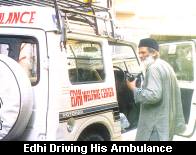 |
Hemmed in by a labyrinth of fabric shops, food markets and dusty, cart-filled lanes, Edhi's three-story Mithadar center is a hive of activity. In the crowded front offices, men and women sit behind donated desks taking ambulance calls, ordering medicines and checking the accounts of clinics and centers across the country. In one room, three women are filling out adoption papers. Bilquis Edhi, who oversees adoptions, has placed more than 16,000 children in adopted homes. Outside every Edhi center there is a cradle-shaded from the sun-where unwanted babies can be left anonymously.
Upstairs, a dozen infants and well-fed toddlers, some rattling across the floor in walking strollers, play and doze as Bilquis chats with a woman who has come to adopt a child for her son and daughter-in-law in the United States.
"The baby she's adopting was starving when it arrived," Bilquis remarks. "When you nurse a child back to life, it really hurts to see her go, even after you've gone through the process thousands of times. Finding her a loving home makes it worth the feeling of loss."
Bilquis tells of the 32-year-old woman who showed up recently at the Mithadar clinic looking for her. The woman explained that her parents had just revealed that they had adopted her as an infant from the Edhi center. "I'm a doctor now, with four children of my own," she told Bilquis. "And I wanted to show my gratitude to the woman who nursed me."
"We both broke down in tears," Bilquis recalls.
With her head loosely covered by a brightly patterned yellow scarf and eyes that twinkle behind black-framed glasses, Bilquis's sunny, lighthearted disposition contrasts with her husband's severe, sometimes impatient manner. The pair met at the clinic when she arrived as an 18-year-old nurse in 1965. A year or so later, they were married.
Their wedding night set the tone for the relationship. Dropping by the dispensary after the ceremony, Edhi found a 12-year-old girl with severe head injuries. The newlyweds rushed her to the hospital and spent the night supervising blood transfusions and calming down distraught relatives.
"I didn't mind at all," Bilquis told Reader's Digest for an article published in 1989. "Today that girl is married with children; that's what is really important."
Even so, Bilquis acknowledges in a playful way, life with Edhi can be trying. "Sometimes I wonder how I stayed my whole life with this man who is a mental case," she says with a smile. "He won't even attend the weddings of his own children, but if there's an emergency somewhere he'll dash out to help in an instant."
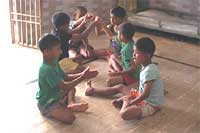 |
| Children playing at the Edhi School |
In a room nearby, a teacher is conducting a class in Urdu, Arabic and counting for around a dozen children three to six years old, some of whom have Down's syndrome. Next door, a female doctor is showing 10 aspiring nurses how to take blood tests; it's part of a six-month course that will lead to their certification as nurse's aides.
"I tell destitute women who come to the centers that they can learn nursing here and later earn their own money as nurses and midwives," Edhi explains back downstairs in his office. So far, around 1500 women have received this training.
Edhi's own passion for healing dates back to his childhood. At age 11, he was obliged to care for his mother, who was paralyzed with a severe diabetic condition. "I bathed her, changed her and fed her," he recalls in his 1996 autobiography, A Mirror to the Blind. "Taking care of my mother made me ponder the misery of others who suffered; from that time on, I began to think of how I could help them, and to dream of building hospitals and a village for the handicapped."
Born in 1928 in Bantva, a small Indian town of 25,000 inhabitants in Gujarat state, he was "not what I would call an obedient child," he admits with a grin. A natural leader, when he was not prodding other kids to join him in stealing corn and fruit from wealthy farmers, he was organizing impromptu circuses and performing gymnastic feats for the neighbors. Although his father brokered textiles and other goods and provided the family with a middle-class income, both of Edhi's parents instilled in him the importance of simplicity and frugal living.
"Every day before school, my mother would give me two paisa and say, 'Spend one paisa on yourself and give the other away,'" Edhi remembers. "When I came home, she would ask me where I had given away my one paisa. It was her way of creating an awareness in me of the need for social welfare."
At the same time he began caring for his mother, he also developed a habit of saving, putting aside one rupee for every five he earned working at a fabric shop after school. This thriftiness served him well, prompting him to gradually acquire government securities. Even now, Edhi takes no salary, choosing instead to live parsimoniously on the interest from these securities.
In 1951, four years after the family moved to Karachi following the 1947 partition of the Indian subcontinent, the 23-year-old Edhi used some of his savings to buy a tiny shop, less than three meters (10') on a side, inside what is now the clinic building. Together with a doctor who taught him the basics of health care, he set up a free dispensary, and he persuaded several friends to help him add free literacy classes. To be available at all times, he slept on a cement bench outside the dispensary.
In 1957, a virulent flu epidemic swept through Karachi. Edhi reacted with unselfish daring, using his own money to erect tented camps on the city's outskirts where people received free immunizations. After the epidemic was brought under control, grateful residents chipped in to buy the rest of the Mithadar dispensary building, enabling Edhi to create a free maternity center and nursing school.
Over the years that followed, Edhi realized that Karachi desperately needed an ambulance service. Impressed by his handling of the flu crisis, a local businessman made a large donation, part of which Edhi used to buy a beat-up van that he converted into a free ambulance and drove himself. "I prided myself on being the first to arrive at an accident," he recalls. Today, Edhi's ambulance service has grown to a fleet of more than 600 nationwide, all paid for with donations. Dispatched from call centers scattered around the country's cities and highways, Edhi ambulances are still usually the first to arrive at the scene, and they have helped cut the fatality toll from road accidents by half, he says.
In 1986, during a hijacking attempt at Karachi airport, Edhi marshaled 54 ambulances at the ready. When negotiations between the hijackers and the government broke down and Pakistani commandos stormed the plane, Edhi and other paramedics entered under fire to try to save wounded passengers and crew.
In 1993, during devastating floods in the Punjab, Edhi ambulances rescued 50,000 people. Using donated planes, volunteers also dropped food, water and supplies to isolated families. Edhi's air ambulance service now numbers three planes and a helicopter, all donated by the US Agency for International Development-"without conditions," Edhi is quick to point out.
"The 1993 flood was the biggest operation we'd ever done; it satisfied Mr. Edhi that we could handle major disasters," explains Anwer Kazmi, a longtime friend and aide, who translates Edhi's Urdu into English.
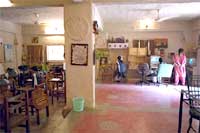 |
| Girls students at the design studio in Bilquis Edhi Center in Karachi |
A stickler for organizational efficiency, Edhi stands up from his desk and goes over to a wall arrayed with stacked drawers of cardboard boxes, each carefully labeled with a year, a location and a subject. "How do you like my computer?" he asks, smiling, as he pulls out a box containing the expense records of the 1993 flood operation. Like his training in health care, Edhi's expertise in administration is self-taught, his business savvy acquired over decades of running a foundation that now occupies some 7330 staff and volunteers. Back at his desk, he leafs through one of the oversize accounting ledgers that he fills with ruminations, anecdotes, recollections and plans.
"Sometimes I wake up in the middle of the night and jot down ideas in these ledgers," he explains. "And in the morning, everyone groans about all the orders I hand down as I try to follow through on my inspirations."
Recently one of those nighttime brainstorms involved setting up emergency clinics on Pakistan's border with Afghanistan to treat victims of the 2001 war. Edhi's son Faisal, 26, who works for the foundation, vividly recalls an incident at one of these clinics that encapsulated his father's demanding nature.
At the new center in Jamun, Faisal explains, local staff members had purchased a dozen chairs for guests and journalists. When Edhi arrived for his own first visit, he blew up. "Why did you waste money on chairs?" he stormed. "Next, you'll be buying beds and other things for yourselves instead of spending the money on the people we intend to help." That night, Edhi himself slept with the ambulance drivers on the floor of the center.
As Faisal finishes his anecdote, Edhi rubs a hand across his balding head and nods in agreement. "People respect me because they see how simply we live and that all the donations go to the people who need help," he volunteers. Only 10 percent of the foundation's overall budget goes toward administrative overhead, including salaries, he adds.
Edhi and Bilquis still occupy a cramped, two-room apartment next to his office in the midst of the hubbub of the Mithadar clinic. He remains on call for emergencies 24 hours a day-just as he has for the past 52 years. "I am always available to all, rich or poor," he says. "Anyone can come into this office and talk to me."
Despite this open-door policy, growing up the children of such a father was not easy. Although Edhi's children were raised largely by Bilquis's mother in a house near the dispensary, they were exposed to pain and misery from an early age. At seven, Faisal recalls accompanying his father to recover the corpse of a murder victim. Edhi brought the body back to Mithadar, washed it and gave it a respectful burial. "I got very sick and couldn't sleep for a week," Faisal recalls.
By the time he was 10, however, Faisal had grown accustomed to riding with his father on ambulance calls to bring the dead and injured to morgues and hospitals. Now, Faisal is in charge of the ambulance service, whose costs he is trying to cut to make it self- sustaining. He's also creating a new dispensary and ambulance center for some 50,000 people uprooted from their Karachi homes by a highway project and forcibly moved to a treeless settlement west of the city where there is no running water, sewage or electricity.
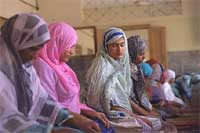 |
| Women praying at the Edhi Center |
Running the Edhi Foundation is very much a family concern. Edhi, Bilquis and their children meet every Sunday at the girls' home in Clifton to confer over problems at the centers and plan new projects.
"We discuss each girl individually," says Edhi's 36-year-old daughter, Kubra, who is as restrained as Faisal is extroverted. "Before the establishment of Edhi homes, young girls who ran away from their families fell into prostitution and other criminal activities. Now they have a place to take shelter."
Some girls flee to the center to obtain the education their families deny them, while others are sent by parents eager to have their daughters educated, but too poor to pay school fees.
"When girls first come, they generally pass the first few days with great difficulty, often getting depressed and tense," Kubra continues. "We involve them in work-taking care of children, mixing with other girls and women. Their lives become more normal after three or four days. If a girl continues to be depressed or has difficulty adjusting, we call a doctor to treat her."
"This is very difficult work, because of fundamentalism," Edhi interjects. "Our society does not want to give any facilities to females. When political opponents criticize us, we never fight them-we ignore them.
"Still, it's very hard to survive if you are working for all the people, not just your particular religious or ethnic group," he acknowledges. "With so much discrimination and growing religious divisions, my children will have a very, very tough time."
In 1992, tragedy drew the family closer than ever. A mentally unbalanced woman staying at the Clifton home scalded Kubra's four-year-old son, Bilal, with bathwater so hot that he died two months later. "Revenge will not bring Bilal back," Edhi advised Kubra at the time. "You must try to forgive the woman." Kubra decided to transfer her to another Edhi center, but not to punish her. That Kubra and the rest of the family continued their work with the mentally disturbed and destitute is powerful testimony to their commitment.
Early the next morning, Edhi sets out with Faisal and Kazmi to conduct a surprise inspection of Edhi Village, a home for runaway and abandoned boys with a separate asylum for mentally ill and physically handicapped men. Halfway into the 45-minute drive south of Karachi, Edhi stops the ambulance at a one-room cinderblock building with a red roof, one of 35 emergency first-aid outposts he's created along the 1100- kilometer (700-mi) highway from Karachi to Peshawar.
As he chats with the paramedic on call, a pair of policemen pull up to the center. Seeing Edhi, they greet him warmly and join in the conversation.
"Before we set up these emergency centers, the police were stretched too thin and many people died in accidents," says Faisal. "Now, they rely on us to respond to 75 percent of road accidents." Nationwide, the Edhi ambulance service receives more than 6000 calls a day.
At the entrance to Edhi Village, the driveway is lined with tamarisk trees covered with yellow blossoms, eucalyptus and palm trees, and beds of purple and white flowers. The courtyard is sprawling and grassy, surrounded by classrooms and dormitories. It contains a playground, a soccer field and volleyball and basketball courts, all of which are used for competitive games with visiting school teams. "Faisal organized the boys to do the landscaping," Edhi says proudly. "It's part of our self-help initiative."
When Edhi purchased the Village's 26-hectare (65-acre) parcel in 1985, it was barren land. Now there are kitchens, workshops, recreation rooms and housing for 250 children in one complex and 1500 mental patients in another.
In one of the classrooms, Edhi singles out an alert-looking 10-year-old pupil with a congenitally deformed hand. "When he was a newborn, this boy was abandoned in one of our cradles outside a center in Karachi," Edhi explains. "Bilquis named him Shazab and took care of him in Mithadar until he was old enough to come here. Now he's one of our smartest students." When Edhi asks him what he'd like to do when he graduates, Shazab breaks into a shy smile. "I want to be in charge of Edhi Village," he says.
Further down the open-air hallway are workshops with sewing machines and stacks of electrical equipment. In one of the rooms, a teacher is demonstrating how to repair a refrigerator motor. Edhi pauses to talk with a 13-year-old boy who explains that he's an Afghan refugee whose parents were killed in the 2001 war. Police picked him up begging on a Karachi street and brought him to an Edhi center. He was later transferred to Edhi Village.
"The boys install all the electrical wiring in the Village and receive enough training to become electricians," Edhi explains. "We also teach them how to sew so that they can get jobs as tailors or clothes makers when they leave."
"Sometimes, parents take their children back home and the kids run away again to come back," adds Kazmi. "The education they receive here is better than the education even middle-class students receive. Also, we provide them with clothes and plenty of food."
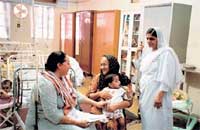 |
| Bilquis Edhi Center has placed more than 16,000 adoptions and also oversees the development of hospitals and vocational services for women. |
In the walled sanatorium for the mentally handicapped, physically disabled and mentally ill next door, the scene is more sobering. Several hundred residents lie on scattered mattresses or sit on the cement floor in one bare, cavernous ward. Elsewhere, groups of men mill about outside under straggly bougainvillea trees. Despite the spartan facilities, "the patients live under far better conditions than in other mental hospitals in Pakistan," maintains Ghulam Mustafa, the senior doctor of a staff of five doctors and eight nurses on rotation.
"We organize games and art activities, and the retarded patients do most of the work themselves, keeping the place neat and clean," he says. "The better-off patients take care of the ones who are more dependent."
Back in Karachi, Edhi stops by a men's psychiatric center to meet with Mohammad Ayaz, a soft- spoken, 40-year-old psychiatrist whom Edhi hired after witnessing his success in rehabilitating mentally ill inmates of the city's central jail. In the front reception room, former patients are busy answering telephone calls and dispatching ambulances.
"Many of our patients can be cured," Ayaz explains, "but their relatives reject them, leaving them here to languish unnecessarily in long-term care.
"Our biggest problem is that we don't have enough trained staff," he continues. "Twelve doctors in rotation have to look after a total of 3500 patients in Edhi Village and six residential centers in Karachi."
One of the men manning the phones stands up to introduce himself in American-accented English. A self-possessed character with a shock of swept-back black hair flecked with gray, 53-year-old Tariq Ayubi says he perfected his English in Miami, where he went to business school. Moving back to Karachi, he married, went into business and thrived. Gradually, however, he began drinking heavily, and he soon lost his job and his wife. Severely depressed and penniless, he sought refuge at the Edhi center. Volunteering for work here saved him, Ayubi says.
"The Edhi Foundation is the only social welfare organization in the country that works," he declares.
Afterwards, Edhi expertly maneuvers the ambulance through teeming streets to the women's sanatorium in north Karachi. As he ambles down the immaculate marble hallways, residents cluster around him, calling out "Abu-ji!" ("Daddy!"). "This adulation makes me nervous," he says. "I'm not some kind of saint."
Seeing one woman sitting on concrete steps distractedly waving flies away from an open sore on her foot, Edhi bends close, asking her gently how long it has been infected. "Two days," she replies, "but it's much worse this afternoon." He calls out for a nurse to attend to the sore. When no one comes, he stalks away impatiently. "Don't worry," he calls over his shoulder to the suffering woman. "I'll be back with a bandage before you know it."
Later on, after Edhi has disinfected and dressed the woman's wound, he sits on a stone bench and listens to other residents tell him heartrending stories of cruel husbands and family betrayal. Driving back to the Mithadar center, he vents his long-running frustration with the plight of women in Pakistan.
"Society goes against the teachings of the Qur'an in mistreating women and not giving them equality," he says with indignation. "Only 10 percent of Pakistani women know how to read and write. That's why we try so hard to give the girls who come to us a good education. Once they get an education, they can start to take control of their lives."
Back at Mithadar, a businessman in a crisp linen shirt and polished shoes is waiting for Edhi in his office. "Here's one who has come around," he says, gripping the man's shoulders in a friendly embrace. Edhi explains that the waiting businessman has launched a partnership with the foundation to assist the poor in starting fabric shops, food stalls and other small businesses. "He's helping them stand on their own rather than giving them handouts that only make them more dependent," says Edhi.
"That's the humanitarian revolution we need," he continues with a weary smile. "But still so few understand. Let's spread the word."
Author: Richard Covington is based in Paris and writes about arts, culture and the media in Europe, the Middle East and Asia for the International Herald Tribune, the Los Angeles Times, Smithsonian, Reader's Digest and other publications. ([email protected])
Photographer: Shahidul Alam is founder of Drik Picture Library (www.drik.net), the Bangladesh Photo Institute, Pathshala (the South Asian Institute of Photography) as well as the biennial Chobi Mela Festival of Photography in Asia. He lives in Dhaka.
For more information on Edhi Foundation go to .. http://www.paks.net/edhi-foundation/
Related Suggestions
THANK YOU VERY MUCH.
ZAFAR IQBAL
MashaAllah.
Fabulous are muslims, we need more such.
I liked the parts about refusing money with attached conditions, frugality, ignoring detractors rathar than taking them on with wasted energies.
Contribution for the well-being of fellow humans by a single man (and his family) is beyond imagination. Mr. Edhi has worked against all odds in his fight to make life a little livable for the helpless.
I invite my fellow Muslims (as well as non-Muslims) to help him continue with his amazing cause by sending financial donations to his foundation so he may continue the good work.
At the same time who can be more deserving of recognition by Nobel Prize Foundation than Mr Edhi? You may make your suggestion to them at [email protected].
Thank you.
Rauf.
He has set an example for ALL of us to follow!
muslims out there. May Allah bless him for all that he has done.
Being a Paksitani and Karachiite, I know how this foundation is helping people. You can find their ambulances and little offices on roadsides everywhere in the city which remind you that good people still live in the world.
Hats off to Edhi, and thanks for this article.












